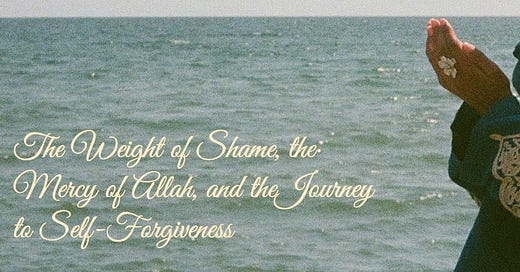Have you ever felt that uneasy feeling in your chest after doing something you knew you shouldn’t have? Some may shame you for putting yourself in a position to sin, but I say be grateful that sin makes you uncomfortable. Many go through life unfazed by their wrongdoings, never repenting, while others let shame consume them so completely that they leave no room for seeking forgiveness. Believe me, you never want to find yourself at either extreme.
That discomfort you feel is a sign of Imaan (Faith)—a reminder that Allah (God) has allowed you to recognize when you’ve disobeyed Him. But never let yourself believe that you are too far gone for His forgiveness—those are just whispers of Shaytan (the Devil).
Sin & Mistakes: A Path to Growth
We must understand that as humans, we were created to sin—not as a flaw in design, but as a test and a gateway to repentance that brings us closer to our Lord. Allah gifted us free will to discern right from wrong. And since we are not made sinless, we are bound to stumble. What truly matters is how we get back up—running toward Allah, making sincere repentance, and striving to be better.
Allah is the Most Forgiving, and He loves to forgive. Since making mistakes is part of being human, seeking His forgiveness isn’t just about erasing sins—it’s a vital step in our spiritual growth and transformation. Repentance holds us accountable, encourages self-reflection, and allows us to take intentional steps toward becoming the best version of ourselves.
But an often-overlooked part of repentance is accepting that Allah has already forgiven you.
The Power of Perception: Trusting in Allah’s Mercy
Prophet Muhammad ﷺ (peace be upon him) said:
"Allah says: 'I am just as My slave thinks I am… If he comes one span nearer to Me, I go one cubit nearer to him; and if he comes one cubit nearer to Me, I go a distance of two outstretched arms nearer to him; and if he comes to Me walking, I go to him running.'"(Sahih Muslim, Book 93, Hadith 502)
Time and time again, Allah reassures us that the mere act of turning to Him, seeking Him, and remembering Him is what guides us toward the Eternal.
A positive perception of Allah is key to a healthy and strong relationship with Him. When we truly believe that He forgives those who seek forgiveness, it grants us peace. It reassures us that no matter how much we stumble, the door of repentance is always open, and His mercy, forgiveness, and love are always near.
Allah’s 99 names reflect His divine attributes, many of which emphasize His boundless mercy and forgiveness:
AR-RA’OOF – The Most Kind: He shows gentleness, care, and compassion in His actions.
AL-‘AFUWW – The Pardoner: He not only forgives sins but erases them entirely.
AL-WADOOD – The Most Loving: He is full of love and affection toward His creation.
AL-GHAFOOR – The Forgiving: He forgives again and again, no matter the magnitude of the sin.
AL-GHAFFAR – The Oft-Forgiving: He continually forgives those who return to Him.
AR-RAHMAAN – The Most Merciful: His mercy encompasses all creation in this world and the next.
AR-RAHEEM – The Bestower of Mercy: His special mercy is granted to the believers.
The Danger of Holding on to our Past
Even after repenting, believing in Allah’s mercy, and striving to right our wrongs, we can still feel wounded by shame. This shame often doesn’t come from Allah—but from ourselves.
I know what it’s like to look back and pick apart the person I used to be—replaying my mistakes and sins over and over, reminding myself of where I went wrong, what I should have done differently, convincing myself that I’m a bad friend, a bad daughter, a bad person, a bad Muslim. Shame creeps in, trapping me in a cycle of insecurity, making me question my worth. But I’ve come to realize that much of this shame stems from comparison and dwelling on the past—measuring my sins and mistakes against those who may not have made the same ones. Whether it happened yesterday or ten years ago, obsessing over it has never done me any good. It only dims my light, making me feel beyond redemption when, in reality, Allah’s mercy has been there all along.
Over time, I’ve realized that trying to erase or disown my past self won’t bring healing. No matter how much I change, that version of me existed. The mistakes I made were part of my journey. Instead of rejecting my past, I have to acknowledge it, learn from it, and move forward.
At the same time, I give myself permission to start fresh. While I take accountability for my mistakes and sins, I won’t let them define me or weigh me down. I can step into a new space—free from the burdens of shame—where I continue to grow, embracing the mercy, forgiveness, and pardon Allah has already granted me.
Remorse vs. Shame: Understanding the Difference
In Yasmin Mogahed’s book "Healing the Emptiness," she explains the difference between guilt (a healthy sense of responsibility) and shame (a destructive judgment of oneself). Shame delays healing and holds us back.
When we neglect to forgive ourselves, we create space for doubt and self-hatred to grow, which ultimately distorts our self-perception. A healthy sense of guilt and accountability leads to growth, reflection, and sincerity in repentance. However, shame deceives us, making us believe we are inherently bad and beyond redemption.
But that is a lie.
We may have done something wrong, but that does not make us bad or unworthy of love, redemption, or growth. Just as Allah forgives and erases our sins entirely, we should strive to forgive ourselves as well.
Allah Would Rather You Sin & Repent Than Never Sin at All
Sinning is not a reflection of our worth—it is part of our design. In fact, Allah prefers that we sin and repent rather than never sin at all.
Prophet Muhammad ﷺ (peace be upon him) said:
"By Him in Whose Hand is my life, if you were not to commit sin, Allah would replace you with people who would commit sin and seek forgiveness from Him, and He would forgive them."(Sahih Muslim, Book 37, Hadith 6622)
Our sins do not define us. What defines us is what we do after we sin.
How willing are we to sincerely seek Allah’s forgiveness?
How much effort are we putting into breaking free from that sin?
What lesson is Allah trying to teach us, and are we truly open to recognizing it?
Because remember:
“Indeed, it is not the eyes that are blind, but it is the hearts in the chests that grow blind.” (Quran, 22:46)
Making Mistakes is Part of the Journey—Not the End of It
Sometimes, it’s our sins and mistakes that bring us closer to Allah and teach us the most valuable lessons. Without them, we might have missed the growth they brought us.
This doesn’t mean we should be careless with our actions. Sinning is part of human nature, but we must still strive to do good and avoid wrong. No matter how much we try, sinning is inevitable—but it is never the end of the road.
So next time you feel shame or believe you’re beyond redemption, seek repentance and remember Allah’s grace, forgiveness, and mercy.
He has pardoned you, and He wants you to forgive yourself, just as He has forgiven you.
“Say, 'O My servants who have transgressed against themselves, do not despair of the mercy of Allah. Indeed, Allah forgives all sins. Indeed, it is He who is the Forgiving, the Merciful” (Quran, 39:53)
Signed,
Your Muse.
[Edited by Amran Waberi]
.







